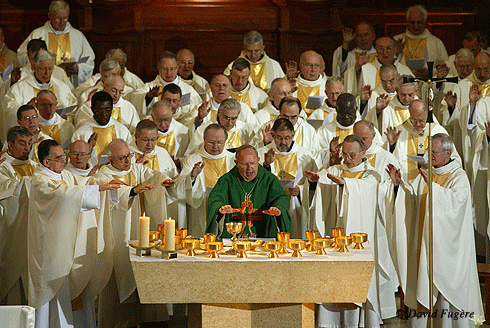Cardinal Ricard (in green)
concelebrating
FRENCH CARDINAL SETS CONDITIONS FOR TRADITIONALIST GROUP
5-October-2006 -- Catholic World News Brief
Bordeaux, Oct. 05 (CWNews.com) - The creation of the new Institute
of the Good Shepherd in France is intended as a "gesture of welcome"
to traditionalists, says Cardinal Jean-Pierre Ricard. But only the
future will show whether the Vatican's acceptance of the new group
is "a promising initiative or a failed hope."
In a column for L'Aquitaine, the pubication of his Bordeaux
archdiocese, Cardinal Ricard discussed the creation of the new
institute, which was announced on September 8 and includes priests
and seminarians who have left the schismatic Society of St. Pius X.
Hoping to ease the concerns of priests and laymen who have expressed
misgivings about the Vatican move, the cardinal said that he is
writing to Rome to ask for some clarification of the status of the
new group, which has Vatican approval to use the Tridentine liturgy
exclusively. "It is important," he said, "that the conditions
established for the recognition of this institute should be better
known."
Concerns about the new traditionalist institute are understandable,
the French prelate said, in light of the "violence" that has
characterized relations between Lefebvrists and the Archdiocese of
Bordeaux in the past. He called for an end to polemics that he said
have become "both tiresome and sterile," and urged both sides of the
conflict to adopt an attitude of "mutual respect and loyal
obedience."
By entering into full communion, the cardinal said, the
traditionalist priests are accepting "the actual magisterium of the
Pope and the bishops." More pointedly, he added that the Good
Shepherd institute should show "a clear position regarding the
magisterial act that was the Second Vatican Council, and the
promulgation of its documents." The generous offer extended to the
traditionalists, he insisted, must not "reopen questions about the
path the Lord has chosen for the Church during the last 40 years."
The Good Shepherd institute will report directly to Rome, the
cardinal confirmed, "on everything regarding its internal life."
However, the group can only be active in a diocese with the
permission of the local bishop. The traditionalist clerics, he
added, would need "a very good reason to have pastoral care for the
faithful."
In Bordeaux, Cardinal Ricard said, the Good Shepherd institute could
only begin pastoral activites after signing an agreement with the
archdiocese. With that agreement in place, he said, a parish church
could be put at the disposal of the traditionalist clerics "for a
fixed period of time."
Cardinal Ricard-- who is a member of the Ecclesia Dei commission
charged with supervision of Church outreach to traditionalists--
said that the Good Shepherd institute was recognized as "an
invitation to overcome suspicion and open a dialogue in a more
fraternal spirit." The creation of this group, he said, was "the
wish of Pope Benedict XVI." |